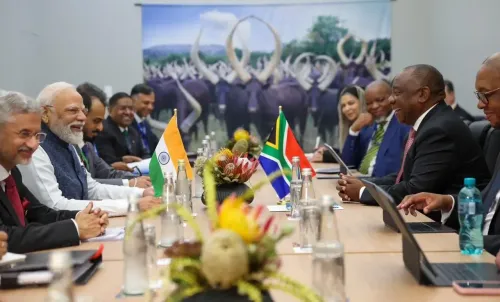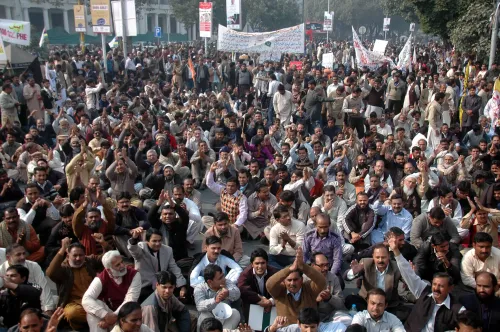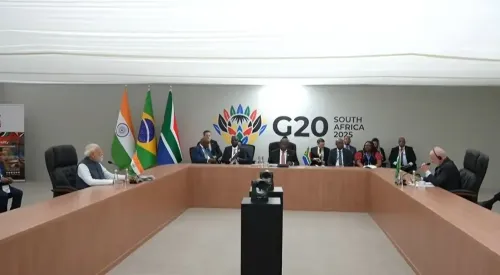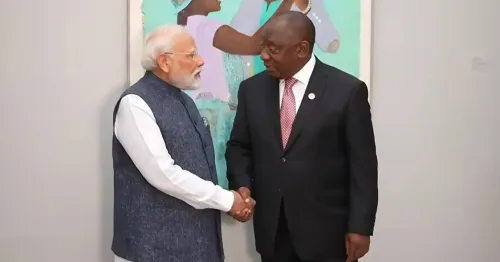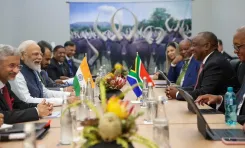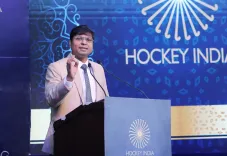Is Hamas Collaborating with Terror Groups in Kashmir?
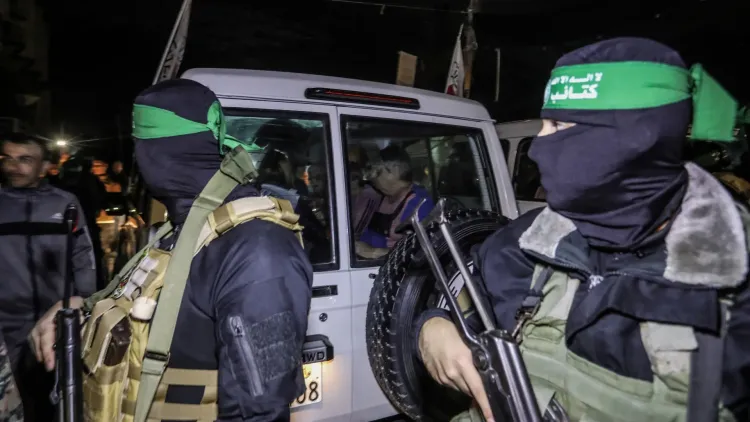
Synopsis
Key Takeaways
- Hamas's collaboration with terror groups in Kashmir is a troubling development.
- John Bolton's insights underline the need for US-India cooperation in counterterrorism.
- The Pahalgam attack reflects the ongoing threat posed by terrorism in the region.
- India has the right to defend itself against attacks originating from Pakistan.
- International attention is crucial in addressing the terrorism issue in South Asia.
New Delhi, May 3 (NationPress) The alarming partnership between Hamas and Pakistan-based terrorist organizations Jaish-e-Mohammed (JeM) and Lashkar-e-Taiba (LeT) in Pakistan-occupied Kashmir (PoK) is a cause for great concern, according to former US National Security Advisor John Bolton in an exclusive interview with IANS on Saturday.
In the wake of the horrific April 22 Pahalgam terrorist attack, which claimed the lives of 26 innocent civilians at the hands of four assailants—two of whom were from Pakistan—intelligence officials have noted alarming parallels between the strategies employed by the Kashmir attackers and the brutal acts committed by Hamas in Israel in October 2023. Several reports indicate that all four attackers received training in PoK, where Hamas has established training facilities within camps run by terrorist organizations.
"If evidence supports this, it would be exceedingly troubling. This concern is one of the reasons why Israel has conducted operations in the Gaza Strip following the October 7 attack, systematically dismantling Hamas. It is undoubtedly a terrorist organization, and any involvement of Hamas, Hezbollah, Houthis, or other Middle Eastern terrorist groups in Kashmir or along the Indian border is a profoundly serious issue," Bolton explained to IANS.
Bolton, who held the position of US NSA during the Pulwama attack in February 2019—also executed by the Pakistan-based JeM that resulted in the deaths of 40 CRPF personnel—elaborated on the pressing need for enhanced cooperation between India and the United States on counterterrorism matters, emphasizing that their bilateral relationship is the most vital for Washington in this century.
Excerpts:
IANS: You were the US NSA during the Pulwama incident; now Pahalgam has occurred. Why does it seem nothing has changed, leaving India vulnerable to terror acts originating from Pakistan?
John Bolton: This is part of a troubling series of terrorist incidents in Kashmir over recent years. It is profoundly tragic for the victims and for the people of Kashmir who cannot enjoy a stable environment. Terrorist activities like this deter tourists from visiting the region. It is crucial to continue investigating the specifics of this incident. When I was National Security Advisor, we faced a similar situation in 2019 with a terrorist attack that stemmed from Pakistani soil. We engaged closely with high-ranking officials in the government. I spoke with National Security Advisor Ajit Doval, and our consensus was that if the Indian government was confident that this attack had originated from Pakistani territory and that the Pakistani government had either failed to prevent it or had assisted it, India had every right to defend itself. The same principle applies today. It is essential for India to convincingly demonstrate the circumstances that would justify a military response, should they choose to take that route. No one desires a broader conflict in South Asia, but the threat posed by terrorist actions is unacceptable. Thus, responding in self-defense is entirely justified.
IANS: Will India receive US support in its fight against terrorism?
John Bolton: The United States has grappled with the issue of Pakistan for a considerable time, even in challenging circumstances, particularly following the events of 9/11. Both Republican and Democratic administrations have unequivocally stated that state-sponsored terrorism is intolerable. Terrorist activities originating from Pakistan will ultimately be attributed to the government if they fail to take action against them. This is a complex issue, but I remain concerned about potential threats from terrorist groups within Pakistan or across the border in Afghanistan. Moreover, I am alarmed by China's growing influence over the Pakistani government, which poses a significant threat to regional peace and security. The stakes are high, and I believe the US should closely cooperate with India, as we have historically done in counterterrorism efforts, and perhaps strengthen that collaboration. Additionally, we must continue to engage with the Pakistani government to convey why this situation must reach a resolution that is acceptable to all parties.
IANS: Recently, Pakistan's Defence Minister Khawaja Asif admitted that the country has been performing "dirty work" for the US for the past thirty years...
John Bolton: I am unsure what he means by that. It is undeniable that during the Soviet occupation of Afghanistan, elements of the Pakistani military, such as the ISI, supported the Mujahideen fighting against the Soviets. If that is what he refers to, I do not view it as illicit behavior; rather, I see it as an effort to assist the Afghan people in reclaiming their nation. That is the extent of my awareness regarding our cooperation with Pakistan on such matters. Conversely, we have collaborated with them within their borders to combat terrorist activity, particularly in the Northwest Frontier Province, where terrorists had sought refuge after fleeing Afghanistan. Thus, it is counterproductive for the Pakistani government to admit to such conduct, as it triggers international scrutiny and undermines not only regional peace and security but also Pakistan's own safety by allowing terrorist groups to operate within its borders.
IANS: Isn’t it time to declare Pakistan a terrorist state?
John Bolton: If their actions warrant such a designation, then they should be classified as such. The United States has never shied away from doing so. However, in this instance, it seems more pertinent that the Pakistani government is failing to exert effective control over its territory, which provides India with legitimate justification to take military action if they choose to do so. This approach would also help mitigate potential escalation, as it would not be seen as an assault on Pakistan itself, but rather on lawless factions within their territory. The issue of terrorism is becoming increasingly severe; it has been a significant concern in the context of Kashmir since partition, along with other terrorist incidents that India has faced in recent years across the nation. This is one reason why I believe US-India collaboration on counterterrorism has been justified historically and could benefit from enhanced cooperation moving forward.
IANS: What is your opinion on India’s decision to suspend the 1960 Indus Waters Treaty (IWT) following the April 22 Pahalgam terrorist attack?
John Bolton: I hope this matter can be resolved between India and Pakistan. The issue of riparian rights is crucial for countries heavily reliant on this water supply for irrigation and other purposes. If prior agreements have become unworkable, all parties will ultimately suffer, especially those in downstream areas. This should send a clear message to Pakistan that engaging in actions that threaten its neighbors has consequences.
IANS: Numerous provocative statements have been made by Islamabad, with Pakistan's Railway Minister Hanif Abbasi stating that the country's nuclear arsenal is not merely for display but is "for India"...
John Bolton: I don’t find that helpful at all. Pakistan is acutely aware that it doesn’t truly desire a full-scale military confrontation with India; they understand their conventional military's relative size and the potential dangers of escalating the conflict. The prospect of either India or Pakistan resorting to nuclear weapons—especially Pakistan first due to the disparity in military capabilities—is not something anyone should be contemplating. Provocative remarks from any party do nothing to alleviate the crisis. Whatever course of action India decides to pursue in self-defense is legitimate, but I hope both sides focus on addressing the core issue: India should not have to endure terrorist attacks, and Pakistan should not allow them to occur.
IANS: Pakistan continues to provide sanctuary to terror masterminds, including Maulana Masood Azhar and Hafiz Saeed, without accountability...
John Bolton: This is precisely the issue we have been discussing with Pakistan for many years, as has the Indian government. Their lack of success is understandably frustrating. This is why India is justified in using military force if they can substantiate the background for this attack in self-defense; however, I believe that such matters should ultimately be resolved through political means rather than through terrorism.
IANS: Isn’t it time for Pakistan to re-enter the grey list of the Financial Action Task Force (FATF)?
John Bolton: Measures have indeed been taken. Pakistan has been on the watchlist multiple times and should continue to be reviewed. If new evidence emerges that warrants stronger actions, the US will stand firmly against state support for terrorism. We have suffered from it ourselves, and our stance has been consistent.
IANS: Many assert that the US has lost interest in the region following its withdrawal from Afghanistan...
John Bolton: I believe we still have a vested interest for several compelling reasons. Regarding Afghanistan, even the Biden administration has testified in open Congressional hearings that the resurgence of foreign terrorist fighters in Afghanistan likely means that ISIS-K could mount terrorist attacks globally again. They plan and operate from Afghanistan. Unfortunately, the return of this terrorist threat since our withdrawal is evident. More broadly, the pressing issue remains China, which is pursuing a hegemonic policy along its Indo-Pacific periphery and in disputed areas along the line of actual control with India, particularly in the vicinity of Kashmir. This situation is delicate, with numerous provocations from China over the years. I remain deeply concerned about the growing Chinese influence over Pakistan, which is detrimental to the interests of the US, India, and regional peace and security. Addressing the threat of terrorist attacks originating from Pakistani territory is a crucial priority for the United States.
IANS: Various reports, including those from Israeli sources, indicate Hamas has formed alliances with Pakistan-based terrorist groups in PoK...
John Bolton: If verifiable evidence exists, I find that highly disturbing. This is one reason why Israel has engaged in operations in the Gaza Strip following the October 7 attack, systematically dismantling Hamas, which is unequivocally a terrorist organization. Any involvement of Hamas, Hezbollah, Houthis, or other Middle Eastern terrorist factions in Kashmir or across the Indian border is a matter of grave concern.
IANS: You have closely interacted with NSA Doval and observed PM Modi's resolute response to terrorism in 2019. What actions do you anticipate from them following the Pahalgam attack?
John Bolton: I expect a well-considered response. I do not believe either individual will act without carefully considering the implications of their decisions and what actions they believe are necessary for defense. I trust that, as was the case in 2019, they will prioritize the protection of India and its citizens, ensuring their rights as a sovereign nation, while also ensuring that their actions can be fully justified.
IANS: What was your initial reaction to the removal of Mike Waltz from the National Security Advisor position?
John Bolton: The second term of Trump seems to be just as chaotic as the first. With Waltz's departure, he has now had five National Security Advisors in less than four and a half years. For the record, I was his longest-serving National Security Advisor. While I may not retain that title by the end of this term, the level of turnover—whether by resignation or otherwise—has been untenable. A stable decision-making team cannot exist if personnel are constantly changing. While Waltz will presumably be nominated as Ambassador to the UN—a position I have also held, which is a nice role—it is not comparable to being National Security Advisor. I believe he has been given a soft landing, but it is unsustainable to have Secretary of State Marco Rubio also serve as National Security Advisor. For Trump's benefit, he should name a full-time successor to Waltz as soon as possible.
IANS: Your views on President Trump's first 100 days in office...
John Bolton: He has achieved some domestic accomplishments; however, I believe there have been numerous international missteps and failures. Regarding Ukraine, I believe it is misguided to negotiate with Iran over their nuclear program, as I doubt the Ayatollahs have any intention of relinquishing their ambitions. Additionally, I fear that the current tariff strategy may lead to significant economic difficulties for all parties involved.
IANS: Despite tariff challenges, do you see India-US relations evolving under PM Modi and President Trump?
John Bolton: From the US perspective, the bilateral relationship with India is arguably the most significant one of this century, given the global threats we face. The personal rapport between Trump and Modi is advantageous, and there is much work to be done on political and military issues to strengthen ties. However, trade disputes make this endeavor more complicated. I wouldn’t have initiated a trade war with every nation; I believe China is the principal bad actor due to practices such as intellectual property theft, subsidizing companies in competition with ours, and failing to open their domestic markets as promised. While that is not the route Trump has taken, it remains the primary issue.

